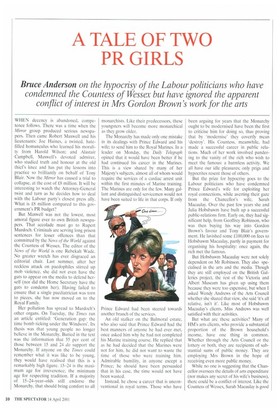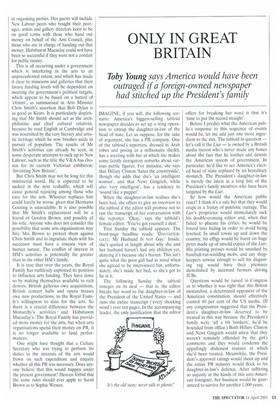A TALE OF TWO PR GIRLS
Bruce Anderson on the hypocrisy of the Labour politicians who have
condemned the Countess of Wessex but have ignored the apparent conflict of interest in Mrs Gordon Brown's work for the arts
WHEN decency is abandoned, competence follows. There was a time when the Mirror group produced serious newspapers. Then came Robert Maxwell and his lieutenants: Joe Haines, a twisted, hatefilled homunculus who learned his morality from Harold Wilson; and Alastair Campbell, Maxwell's devoted admirer, who studied truth and honour at the old thief's knee and has put the lessons into practice so brilliantly on behalf of Tony Blair, Now the Mirror has caused a trial to collapse, at the cost of a million. It will be interesting to watch the Attorney-General twist and turn as he decides how to deal with the Labour party's closest press ally. What is £.8 million compared to this government's PR budget?
But Maxwell was not the lowest, most amoral figure ever to own British newspapers. That accolade must go to Rupert Murdoch. Criminals are serving long prison sentences for lesser offences than that committed by the News of the World against the Countess of Wessex. The editor of the News of the World is one Rebekah Wade. No greater wretch has ever disgraced an editorial chair. Last summer, after her reckless attack on paedophiles stirred up mob violence, she did not even have the guts to appear on the media to defend herself (nor did the Home Secretary have the guts to condemn her). Having failed to ensure that a single paediatrician was torn to pieces, she has now moved on to the Royal Family.
Her pollution has spread to Murdoch's other organs. On Tuesday, the Times ran an article entitled: 'Generation gap: the time bomb ticking under the Windsors'. Its thesis was that young people no longer believe in the Monarchy. Buried in the text was the information that 55 per cent of those between 15 and 24 do support the Monarchy. If anyone on the Times could remember what it was like to be young, they would have realised that this is a remarkably high figure. 15-24 is the maximum age for irreverence; the minimum age for respecting tradition. If a majority of 15-24—year—olds still endorse the Monarchy, that should bring comfort to all monarchists. Like their predecessors, these youngsters will become more monarchical as they grow older.
The Monarchy has made only one mistake in its dealings with Prince Edward and his wife; to send him to the Royal Marines. In a leader on Monday, the Daily Telegraph opined that it would have been better if he had continued his career in the Marines. This is a view shared by many of her Majesty's subjects, almost all of whom would require the services of a cardiac arrest unit within the first minutes of Marine training. The Marines are only for the few. Many gallant and distinguished servicemen would not have been suited to life in that corps. If only Prince Edward had been steered towards another branch of the services.
An old stalker on the Balmoral estate, who also said that Prince Edward had the best manners of anyone he had ever met, once asked him why he had not completed his Marine training course. He replied that as he had decided that the Marines were not for him, he did not want to waste the time of those who were training him. Admirable humility, in anyone except a Prince; he should have been persuaded that in his case, the time would not have been wasted.
Instead, he chose a career that is unconventional in royal terms. Those who have been arguing for years that the Monarchy ought to be modernised have been the first to criticise him for doing so, thus proving that by 'modernise' they covertly mean 'destroy'. His Countess, meanwhile, had made a successful career in public relations. Much of her work involved pandering to the vanity of the rich who wish to meet the famous: a harmless activity. We all have our idle pleasures; only prigs and hypocrites resent those of others.
But the prize for hypocrisy goes to the Labour politicians who have condemned Prince Edward's wife for exploiting her royal connections, while averting their gaze from the Chancellor's wife, Sarah Macaulay. Over the past few years she and Julia Hobsbawm have built up a successful public-relations firm. Early on, they had significant help, from Geoffrey Robinson, who was then buying his way into Gordon Brown's favour and Tony Blair's government. He lavished some £.100,000 on fees to Hobsbawm Macaulay, partly in payment for organising his hospitality: once again, the rich met the famous.
But Hobsbawm Macaulay were not solely dependent on Mr Robinson. They also specialised in the arts and the media. Though they are still employed on the British Galleries project, the rest of the Victoria and Albert Museum has given up using them because they were too expensive, but when I asked Wendy Andrews of the Arts Council whether she shared that view, she said 'it's all relative, isn't it'. Like most of Hobsbawm Macaulay's clients, Miss Andrews was well satisfied with their activities.
But what are these activities? Many of HM's arts clients, who provide a substantial proportion of the Brown household's income, have one thing in common. Whether through the Arts Council or the lottery or both, they are recipients of substantial sums of public money. They are employing Mrs Brown in the hope of receiving even more public money.
While no one is suggesting that the Chancellor oversees the details of arts expenditure (nor makes any secret of his wife's business), there could be a conflict of interest. Like the Countess of Wessex, Sarah Macaulay is good at organising parties. Her guests will include New Labour peers who bought their peerages, artists and gallery directors keen to be on good terms with those who hand out money on behalf of the Arts Council, plus those who are in charge of handing out that money. Hobsbawm Macaulay could not have been so successful if they were not a conduit for public money.
This is all occurring under a government which is interfering in the arts to an unprecedented extent, and which has made it clear to museums and galleries that their future funding levels will be dependent on meeting the government's political targets, which appear to be based on a hatred of 'elitism', as summarised in Arts Minister Chris Smith's assertion that Bob Dylan is as good as Keats. It is particularly dispiriting that Mr Smith should act as the archphilistine and chief cultural relativist, because he read English at Cambridge and was nourished by the very literary and artistic heritage which he now brushes aside in pursuit of populism. The results of Mr Smith's activities can already be seen, in some desperate attempts to suck up to New Labour, such as the title the V&A has chosen for its current Victorian exhibition: 'Inventing New Britain'.
But Chris Smith may not be long for this ministerial world. He is expected to be sacked in the next reshuffle, which will cause general rejoicing among those who care for the arts. Whoever replaces him could hardly be worse, given that Hermann Goering is unavailable. It is also possible that Mr Smith's replacement will be a friend of Gordon Brown, and possibly of his wife. Anyone who does not consider the possibility that some arts organisations may hire Mrs Brown to protect them against Chris Smith and to ingratiate them with his successor must have a roseate view of human nature. The conflict of interest in HM's activities is potentially far greater than in the other HM's family.
It is true that over the years, the Royal Family has ruthlessly exploited its position to influence arts funding. They have done so by making themselves available to rich donors. British galleries owe acquisitions, British concert halls and opera houses owe new productions, to the Royal Family's willingness to dine for the arts. So there is a crucial difference between the Monarchy's activities• and Hobsbawm Macaulay's. The Royal Family has provided more money for the arts, but when arts organisations spend their money on PR, it is no longer available to fund performances.
One might have thought that a Culture Secretary who was trying to perform his duties in the interests of the arts would frown on such expenditure and enquire whether all this PR was necessary. Does anyone believe that this would happen under the present government? Heaven forbid that the same rules should ever apply to Sarah Brown as to Sophie Wessex.



























































 Previous page
Previous page